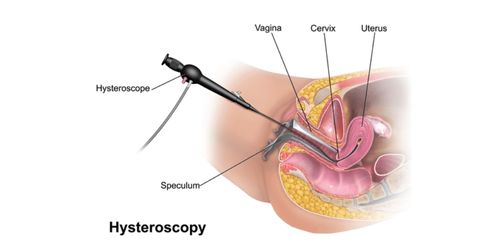Diagnostic Hysteroscopy
Diagnostic hysteroscopy is a minimally invasive procedure that allows your gynecologist to directly visualize the inside of your uterus using a thin, lighted telescope called a hysteroscope. It helps diagnose issues such as abnormal uterine bleeding, infertility, polyps, fibroids, and uterine abnormalities. This procedure is often done in a day-care setting and requires minimal recovery time.

What to Expect
Before the Procedure
- Initial consultation and ultrasound imaging
- Fasting may be required if anesthesia is planned
- Blood tests and allergy history reviewed
- Procedure usually scheduled just after menstruation
During the Procedure
- The hysteroscope is gently inserted through the vagina and cervix into the uterus
- Sterile fluid is used to expand the uterine cavity for better visibility
- The doctor examines the endometrial lining and records any abnormalities
- Usually completed in 10–30 minutes
After the Procedure
- Mild cramping or spotting may occur
- Normal activities can be resumed within a day
- Results are discussed during follow-up consultation
:max_bytes(150000):strip_icc():format(webp)/hysteroscopy-faqs-3521073_final2-933bd501dd7f4ed7bb1ac2e0368cf614.png)
Benefits of Diagnostic Hysteroscopy
- Accurate diagnosis of uterine conditions
- Guides fertility treatment planning
- Minimal discomfort and quick recovery
- Often avoids need for more invasive procedures
Ideal Candidates
- Women with heavy or irregular menstrual bleeding
- Infertility or repeated miscarriage concerns
- Suspected polyps, fibroids, or uterine anomalies
- Postmenopausal bleeding
Pre- and Post-Procedure Care
Pre-Procedure: Avoid intercourse and vaginal medications 24 hours before the procedure. Take prescribed medication to relax the cervix if advised.
Post-Procedure: Light bleeding is normal. Avoid swimming or intercourse for 2–3 days. Painkillers may be used if needed. Watch for signs of infection such as fever or foul-smelling discharge.
Testimonials
"I was nervous at first, but the procedure was smooth and pain-free. It helped detect the polyp that was affecting my cycles." – Pallavi D., 34
"Diagnostic hysteroscopy gave me the clarity I needed before starting IVF. Thanks to Dr. Rainee for her care!" – Swati R., 30
Frequently Asked Questions
Is diagnostic hysteroscopy painful?
Most women experience mild cramping, similar to menstrual pain. It’s usually well-tolerated and can be done with or without anesthesia.
Can I return to work the same day?
Yes, most patients resume daily activities within 24 hours.
Does it affect my fertility?
It does not harm fertility. In fact, it helps diagnose and treat fertility-related conditions.
Is it safe?
Yes, diagnostic hysteroscopy is considered very safe when performed by experienced professionals.
How soon will I get the results?
Preliminary findings are often shared immediately; biopsy reports, if taken, are available in a few days.
Contact Dr. Rainee Agrawal
For a clear diagnosis and expert care in women’s health, book your consultation today.
Contact Us
+91 9179559565
Contact Person: Dr. Rainee Agrawal